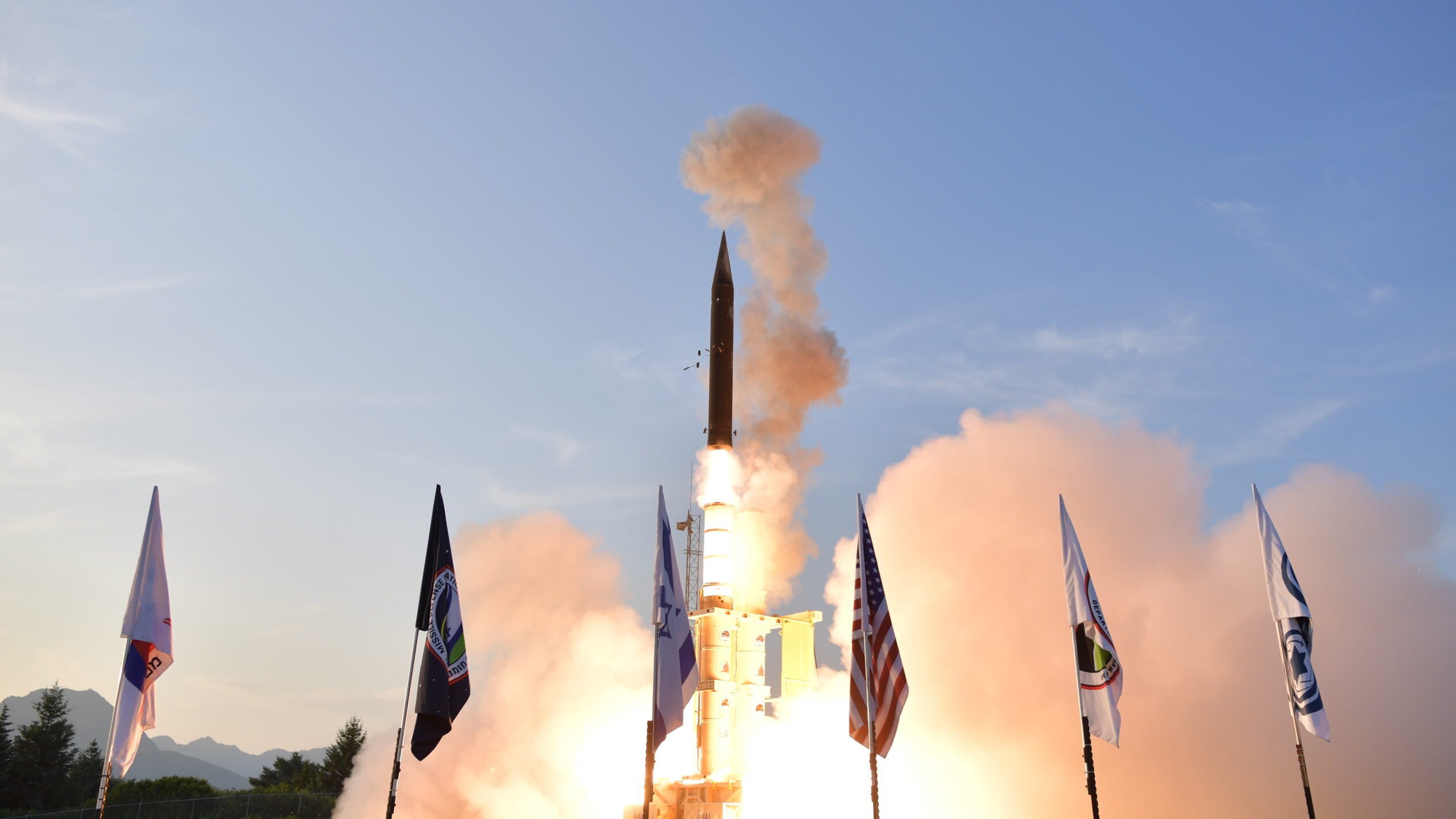
IAI’s Arrow system has notched a major win in Germany. (IAI)
PARIS AIRSHOW — Just days after the German government passed an initial budget to help buy the Israel Aerospace Industries Arrow air defense system, the company is hoping to build on its momentum on the continent at the Paris Air Show.
The firm, Israel’s largest defense company, is showing off Arrow in Paris, alongside its lines of UAVs and loitering munitions — a trio of offerings that Boaz Levy, CEO of IAI, believes can help expand the firm’s footprint in Europe.
“There is a lot of attention on Arrow 3 in the last few days because we are about to sign a deal with the German government with respect to ballistic missile defense utilizing Arrow-3 capabilities,” Levy told Breaking Defense in an interview ahead of the show. “We are speaking about an important project that should be cleared by the three administrations; the German, US and Israeli, by the Ministry of Defense.”
FULL COVERAGE: Paris Airshow 2023
While the deal would need approval by the US, as Washington helped co-develop the Arrow system, Levy expressed confidence it’s just a matter of if, not when, that happens. He said all sides are speaking together on a government level and said, “We are on the right approach and final phase to receive this approval. I think it will be received real soon.”
Overall, the German Arrow buy is estimated at up to €4 billion ($4.4 billion). Levy noted that there are still discussion to happen on “the capabilities that are required and the adjustments that are needed and many other applications,” such as details of supplying the Green Pine radar and ballistic missile defense command and controls together with launchers and missiles.
Levy, who has a background as an engineer, played a key role in the Arrow program from its early years. He noted that depending on how the system is deployed, it can protect areas around Germany’s borders. “If you deploy close to the border with allies it means that it protects allies as well, as you purchase more, there is more coverage,” he said.
RELATED: Whether Iran’s ‘hypersonic’ weapon is real or not, Israel has to plan to react, experts say
He also said that the company is thinking about future threats, although he wouldn’t expand on specifics.
“Our philosophy is to think two steps ahead and while [thinking] two steps ahead you are not thinking of current threats to protect soil but future capabilities as well. From what I understand we have capabilities for current threats and we are working on future capabilities and more than that.”
Asked if he foresaw more Arrow sales after the German deal, he said, “I would like to sell more, but it is a political decision and we are working under the guidance of [Israel] Ministry of Defense.” He has confidence the system can be delivered to Germany by 2025, despite the short time period.
UAVs And Other Systems For Europe
The German deal is undoubtedly the crown jewel of the company’s European expansion plans, but IAI has had other successes on the continent.
IAI’s Elta subsidiary saw a number of recent sales in Europe of its Multi-Mission Radar. For instance, IAI delivered its Multi-Mission Radar to the Czech Republic in April 2022 as part of a deal agreed in 2019 between the Czech and Israeli Ministries of Defense. In 2021 Slovakia also acquired radars from IAI.
“Each country purchased its own required radar for several protection capabilities and to create an air situation picture and ground situation picture utilizing radar capabilities. If you ask me where it will lead to, at the end of the day we will come into optimized capabilities of our radars that will create the right air situation picture and work in a common system of system capabilities,” said Levy.
IAI is also focusing on its Barak MX air and missile defense system in Paris. This serves naval and land-based applications, Levy said. He described it as the “optimal solution for many types of threats and does it in a unique way for every trajectory and scenario, and you can optimize capabilities for land or naval and use radars at sea and land, to launch the right interceptor toward the target you allocated.”
Recent conflicts in Europe — Ukraine, certainly, but also the fights between Armenia and Azerbaijan — have also illustrated the importance of various types of UAVs and loitering munitions, two categories of capabilities that IAI has invested in for decades.
The anti-radar munition Harpy and the loitering munition Harop are both used for striking high value targets.
“We offer loitering munitions that range in size from small to large. They are unique. They have their own smart way of reaching the threat and can be utilized and synchronized applications and we are there in many countries that are required to attack enemies,” said Levy. “We are in the advanced stages of designing the next generation; we have others aside from the Harop and Harpy.”
He noted that the company also makes the smaller Rotem loitering munition and that the company is investing in using artificial intelligence and big data to create “solutions for existing threats.”
Israel’s defense sector has been booming in recent years, and received historically high orders in 2022, with exports at more than $12 billion. Levy noted that the firm has more than $7.5 billion in new orders on the books, both from Israel and from abroad.
The company also has partnerships abroad, such as a recent agreement with MBDA Germany to focus on joint promotion of solutions in the fields of Electronic Warfare and EW training in Germany. IAI also acquired a company called Intracom Defense in Greece, which specializes in missile launchers.
“As we grow, so do our partnerships, and this allows us to be more global,” Levy noted.












